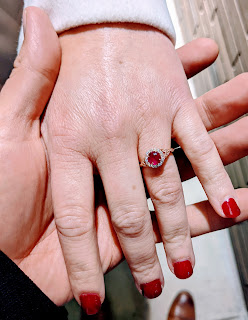No Joy Uncomplicated (On Getting Engaged)
I recently got engaged.
Obviously, that is a joyful event. An unanticipated joy—we both feel like we stumbled into it, into each other and feelings of desire, a passing past connection unexpectedly rekindled. And a deep joy—both of us have lived stories that were in different ways heartbreaking, which makes the sweetness of blossoming love all the sharper.
Yet the joy is not uncomplicated. There is a bittersweetness in it for both of us. We talked about it the night we got engaged, driving in a van, between the smiles and glances at the ring on her finger. There is the reality of continued grief, of missing a person that is no longer here while also delighting in this new person who is. Human loves are not replaceable or interchangeable. There are wounds of her story and the trauma that lingers. The messiness and pain of unavoidably hard relationships interwoven with us and our pasts and future. The looming emotional hardness of blending families, with all the insecurities of a house with six children with their own traumatic pasts and practical difficulties and years of transition that entails. We are thrilled; we also ache.
Here’s the thing: that isn’t a new feeling. It is crystalized in this moment of getting engaged because of its stark clarity, but it has been a reality not just for our dating (which has been emotionally complicated in a dozen different ways) but for all of life. Even before this relationship; even before my first wife’s death. The older I get, the more I realize there are no uncomplicated joys. Every happiness is mixed with sorrow. Even the most intensely good moments come with reminders of what is not and should be. The person who isn’t there to enjoy it. The past pain it makes us recall. The scars on our heart that keep us from entering into it fully.
Partly, I write all that simply to say, “I think that is okay. It isn’t wrong for our joy to be complicated.” You can be both happy and sad at the same time. You can be thankful for what is and long for what is not. You can have grief and laughter in your heart together. I have met many on the journey of life who have not understood this truth and so are robbed of the golden sunsets because they believe they cannot coexist with the lengthening shadows.
More than that, though, I think it highlights the beautiful and broken reality of our world. We are image-bearers of the King in a very good world where we abuse and deface that image and wound and are wounded by sin. Every goodness in this world comes with a shadow; every blessing is colored by the curse. We are called to gratitude, but we are also called to a holy discontent that says, “I am grateful for all that I have been given, yet I long for something more.”
This longing is especially present in our human loves and the marrying and celebrating and life-creating that accompany them. Every human love contains an echo of the divine first love that stands at its root—the pure love between Father, Son and Spirit, and the overflowing love that led to the creating and joining of our first parents. This is what makes these loves so sweet, but it is also what highlights how they fall short. If we fail to realize their source in our perfect but lost union with our Maker, we will remain forever discontent and tempted to idolatry. We will try to satisfy ultimate longings with fallen things and so even their goodness will be consumed by what is lacking. We will forever chase a sort of love that can never be, leaving behind the complicated but wonderful love that exists in this age.
Our hearts have an instinct that joy should be uncomplicated. That love should be only sweetness. Why? Because our hearts know that this world is not as it should be. C.S. Lewis famously commented that, “If we find ourselves with a desire that nothing in this world can satisfy, the most probable explanation is that we were made for another world.”
In Jesus, that world is coming. That world will free us from bondage to the brokenness, because it will end. We can celebrate the good parts of this world, knowing that in Him they are what will endure. Yet it also frees us from the need to pretend like that world has arrived. This life is sweet and bitter. We should grieve what is not and celebrate what is, rejoicing in what we already have and longing for what has not yet arrived. This is the posture of Christianity.
And in particular, in this season, it strikes me that
this is the posture of Advent. Jesus has come. Jesus has not yet come again. We
celebrate the birth of a dream and a promise even as that dream reveals the
nightmare around it and that promise has not yet been fulfilled. Advent, like
life, is a complicated season. May we dwell in the whole of it, both naming the
shadows and refusing to let them mask the Light that has come.
